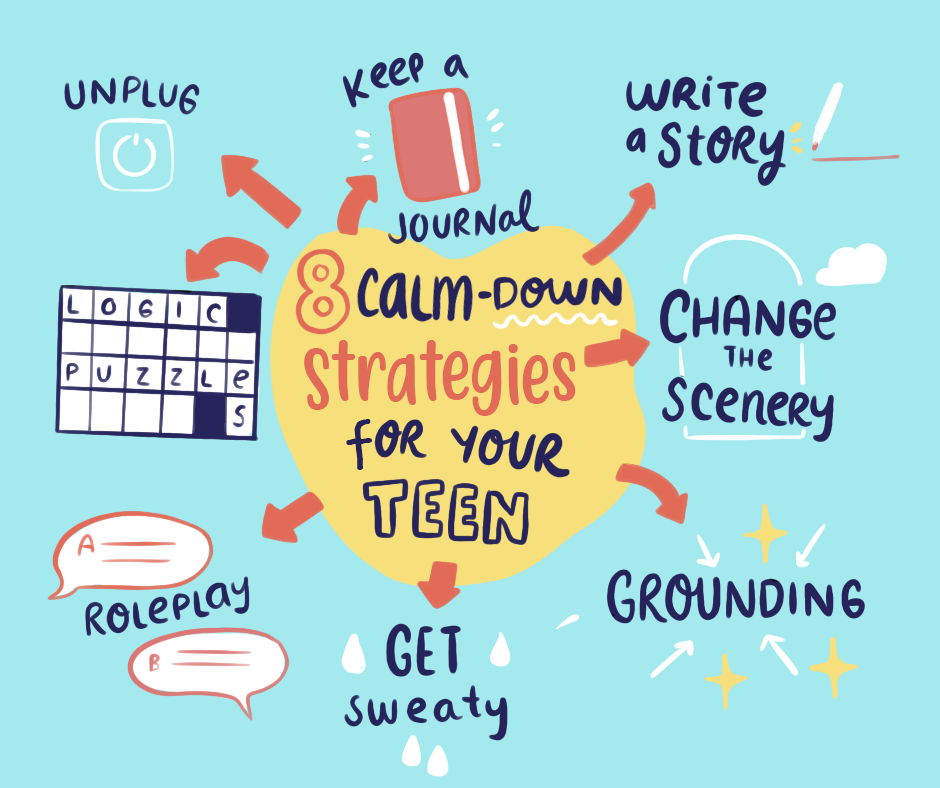Even as adults, it can be tough to calm down when we feel heated, anxious, or frustrated. Throw in the hormones of a teenager, and it’s easy to understand why middle school, high school, and even college students are so prone to feeling out of control. Here, we’ll take a look at some concrete strategies you can try with your teen when they need a moment to center and re-focus after anxiety, anger, or a setback.

1. Write a story
If your teen enjoys writing, asking them to pen out their story in the third person — referring to themselves as a character — can help them to get some perspective on a stressful situation. They may also be able to see new solutions for their “character” as they write out the details of the event(s). If your teen doesn’t care for writing, you might want to skip this tip — the last thing you want to give a stressed-out teen is a task that makes them feel even worse. If your teen is down for writing the story, let them know that they don’t have to share it with you (and don’t peek if they prefer to keep it private).
2. Change the scenery
Changing the environment can help your teen’s brain reset from stress, anxiety, or frustration. The simple switch of moving from inside to outside, from chilly to warm, or even from dim to bright can help them get a few seconds of valuable distraction while refocusing their mind on something outside of their issue.
3. Grounding
This technique is beloved by counselors for a few reasons: it’s simple, it almost always works, and you can do it anywhere. Grounding brings the attention back to the present moment. An easy grounding technique: ask your teen to notice three things they can hear, three things they can see, three things they can touch, and three things they can smell. Noticing the colors of the rainbow around them can also be helpful: finding one red object, one orange object, one yellow object, etc.
4. Get sweaty
Intense exercise doesn’t just help to work out pent-up frustration; it can also provide a valuable endorphin boost that can help your teen burst out of a rut. If your teen wants some company, joining them in their activity may provide the perfect opportunity for them to vent and give you some insight into what’s been getting them down. If your family can swing it, offering your teen a workout outlet that makes them feel special — like a YMCA or gym membership — can give them a space to change their environment, get their sweat on, and have the room they need to work out their thoughts.
5. Role-play
Carefully consider whether your teen will be down for this before you ask (some aren’t). Role-playing can be a great way to practice how to handle stressful situations. There are some scenarios where this can work wonders (such as getting ready for talking with a teacher about changing a grade) and others for which it isn’t a great fit (having a tough conversation with a boyfriend or girlfriend). Asking your teen tough questions that they’re likely to face from the other person in the conversation can give them the confidence boost they need to relax.
6. Logic puzzles
Solving a puzzle — especially one involving numbers — can work wonders for calming an anxious teen. Focusing on logic forces your teen to step back from their emotions, even if it only works for a few minutes. This brief space away from thinking about the problem can allow your teen’s brain to begin to relax and release the dopamine necessary to face the issue with a renewed perspective.
7. Unplug
We’re all plugged in, all the time. Encourage your teen to take a tech break — even for half an hour — to calm, relax, and allow the brain to begin to see things in a new light. This can be especially helpful if the source of your teen’s anxiety comes from social media, texting, or waiting for grades to post.
8. Keep a journal — and refer back during tough times
Writing in a journal isn’t just a valuable outlet for letting go of tough feelings. It can also be used as a roadmap for how to deal with tough situations. When your teen is struggling, encourage them to first write in their journal, then also read back to find other times they faced (and made it through) similar issues. Revisiting times that they struggled and came out on top can remind your teen that they’re stronger than they feel.
These calm-down strategies for teens are really very important and i agree with your points.
I just LOVE all that you produce! My students and I love to create Green Screen videos to teach all things Mindfulness! Namaste!
very nice post
Are dummies good for teenagers